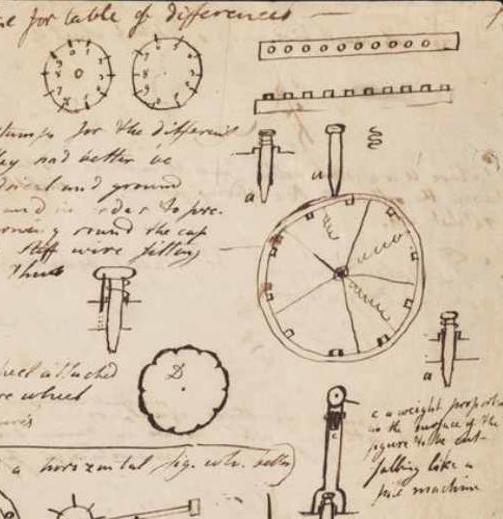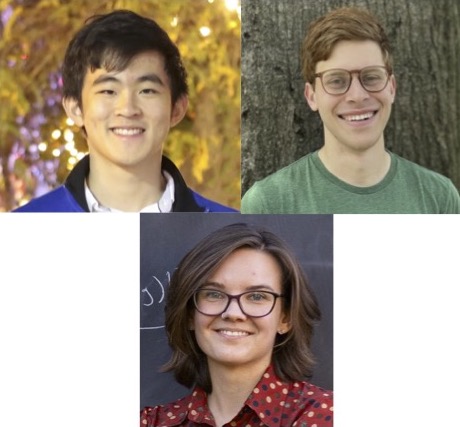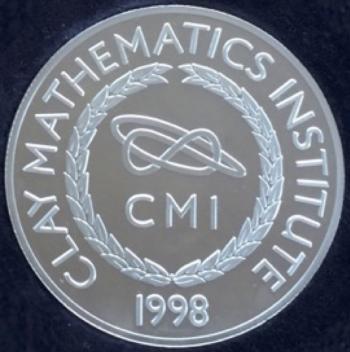EMS Prizes awarded at Opening Ceremony of 8ECM
Date: 23 June 2021

Congratulations to Aleksandr Logunov, Simion Filip, Jack Thorne, and Maryna Viazovska who were each awarded a European Mathematical Society Prize at the opening ceremony of the 8th European Congress of Mathematics this morning. Simion and Aleksandr are current Clay Research Fellows, Jack is a former Clay Research Fellow (2012-17), and Maryna won the Clay Research Award in 2017.
Ten European Mathematical Society Prizes are awarded at the European Congress of Mathematics every four years. These prizes recognise outstanding contributions to mathematics by European mathematicians under the age of 35. The list of all the Prize Winners can be found at https://8ecm.si/prizes
The presentation of the Prizes was the highlight of the the first day of the Congress, which was opened by the President of Slovenia, His Excellency Borut Pahor. The Prize Winners were introduced by the President of the Clay Mathematics Institute, Martin Bridson, chair of the Prize Committee for the Congress.
The citations explaining the awards to Simion, Aleksandr, Jack, and Maryna were as follows.
“A European Mathematical Society Prize is awarded to Simion Filipfor breakthroughs that have advanced the understanding of the geometry and dynamics of moduli spaces. Drawing ingeneously on ideas from Hodge theory and dynamical systems, he has resolved a string of major conjectures in the field. He proved that the orbit closures appearing in the celebrated rigidity theorem of Eskin-Mirzakhani-Mohammadi are quasi-projective algebraic varieties; he established a versionof Deligne semisimplicity for the Hodge bundle over every orbit closure; and with Eskin and Wright he extended the rigidity results of Eskin-Mirzakhani to the equivariant action on the natural flat bundle over the moduli space. He is also recognised for his work on the dynamics of the moduli space of complex surfaces, and for his results concerning Lyapunov exponents of higher-rank local systems.”
“A European Mathematical Society Prize is awardedto Aleksandr Logunovfor his fundamental contributions to the analysis of partial differential equations. In a remarkable series of papers (some joint with Eugenia Malinnikova), Logunov introduced new combinatorial-geometric techniques to study solutions of second order ellitpic PDEs. These techniques enabled him to solve longstanding problems of central importance in the field, including Nadirashvili’s conjecture that the zero set of a non-constant harmonic function in n-dimensional space has infinite (n-1)-dimensional volume, and a conjecture of S-T Yau concerning the optimal lower bound on the measure of the nodal sets for eigenfunctions of the Laplacian on compact manifolds.”
“A European Mathematical Society Prize is awardedto Jack Thornefor multiple breakthroughs in diverse areas of algebraic number theory. These include the proof, with Clozel, that the 5th, 6th, 7th and 8th symmetric power L-functions of an elliptic curve over the rational numbers, or of an elliptic modular form, are entire; the construction, with Harris, Lan, and Taylor, of systems of l-adic representations attached to all regular algebraic cuspidal automorphic forms on GL(n) over CM-fields; and the introduction of highly novel techniques and constructions in arithmetic invariant theory, which combine Lie theory with the study of singularities and their deformations, to obtain striking new results on the arithmetic of curves.”
“A European Mathematical Society Prize is awardedto Maryna Viazovskafor her groundbreaking work on discrete optimisation and in particular for her stunning and elegant resolution of the sphere packing problem in dimension 8, and her subsequent work with Cohn, Kumar, Miller and Radchenko resolving the sphere packing problem in dimension 24. She is also recognized for her work resolving significant cases of the Gross-Zagier Conjecture, and for her work with Bodarenko and Radchenko resolving a longstanding conjecture of Korevaar and Meyers on spherical designs. Her novel use of the theory of modular forms has had a dramatic impact in discrete geometry, analytic number theory, and harmonic analysis.”



